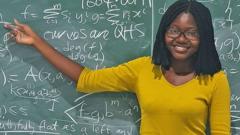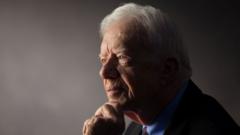Alessio Figalli, a renowned mathematician affiliated with ETH Zurich and the Institute for Advanced Study in Princeton, has carved out a niche in optimal transport—the study of the most efficient paths connecting starting and end points. Optimal transport, a concept dating back nearly 250 years, marries both practical engineering challenges and theoretical mathematics, embodying the Latin roots of the word "optimize," which means to "make the best of things."
Figalli, who received the prestigious Fields Medal in 2018, is drawn to mathematics that confronts tangible issues in the real world. He appreciates the discipline's permanence, remarking in a recent discussion, “There’s no ambiguity; it’s true or false. In a hundred years, you can rely on it, no matter what.” His fascination with optimal transport stems from its historic underpinnings; French mathematician Gaspard Monge originally introduced the subject in the context of military logistics, optimizing resource allocation during the Napoleonic Era.
A pivotal moment for the field came in 1975, when Russian mathematician Leonid Kantorovich was awarded the Nobel Prize in Economic Sciences. His work provided a rigorous mathematical framework for resource distribution, illustrated by scenarios such as ensuring bakeries accurately delivered croissants to coffee shops. Figalli elaborated, “It’s called a global wellness optimization problem. It’s about optimizing the utility for everyone, complicating it since one player's decision can ripple through all others.”
The following interview with Figalli, conducted at a New York City event hosted by the Simons Laufer Mathematical Sciences Institute, reveals his deep commitment to marrying theoretical mathematics with real-world applications, positioning optimal transport as an indispensable tool for future innovations across various fields.
Figalli, who received the prestigious Fields Medal in 2018, is drawn to mathematics that confronts tangible issues in the real world. He appreciates the discipline's permanence, remarking in a recent discussion, “There’s no ambiguity; it’s true or false. In a hundred years, you can rely on it, no matter what.” His fascination with optimal transport stems from its historic underpinnings; French mathematician Gaspard Monge originally introduced the subject in the context of military logistics, optimizing resource allocation during the Napoleonic Era.
A pivotal moment for the field came in 1975, when Russian mathematician Leonid Kantorovich was awarded the Nobel Prize in Economic Sciences. His work provided a rigorous mathematical framework for resource distribution, illustrated by scenarios such as ensuring bakeries accurately delivered croissants to coffee shops. Figalli elaborated, “It’s called a global wellness optimization problem. It’s about optimizing the utility for everyone, complicating it since one player's decision can ripple through all others.”
The following interview with Figalli, conducted at a New York City event hosted by the Simons Laufer Mathematical Sciences Institute, reveals his deep commitment to marrying theoretical mathematics with real-world applications, positioning optimal transport as an indispensable tool for future innovations across various fields.


















